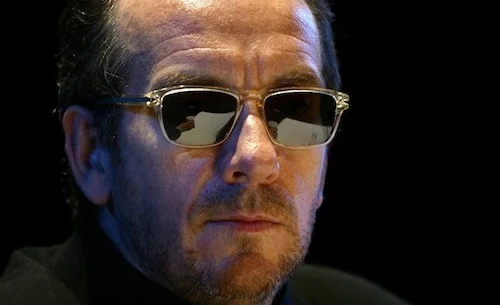
11.27.2015
ELVIS COSTELLO’S ‘UNFAITHFUL MUSIC’: EVERYDAY HE WROTE THE BOOK
Journal Sentinel: Kathy Flanigan: October 2015
Full disclosure: I love Elvis Costello.
Since 1979, I’ve carried a torch for the man based on songs that were short but complex; and lyrics so biting they touched on paranoia but were always always clever.
His autobiography “Unfaithful Music & Disappearing Ink” only fuels the fire. I’m tempted to write “Mrs. Kathy Costello” in the margins of the book.
The fellow born Declan MacManus chronicles a winding, sometimes improbable, career path from angry young man of New Wave to the song-but-no-dance man who performed his 40-year catalog solo at the Riverside Theater in 2014.
In between, Costello filled out his repertoire by penning orchestral music and opera, acting now and again (we’ll just skip, as he does, the ‘Two and a Half Men’ stint) and collaborating with legends from Burt Bacharach to Bob Dylan.
His affection for music is pronounced. He’s starstruck when he meets Diana Krall; awestruck when Aretha Franklin answers her own phone; and dumbstruck when he composes with Bacharach.
The writing isn’t linear, but it’s easy to follow. His stories about Levon Helm, Johnny Cash or ABBA go back in forth in time in conversational rhythm.
It’s confessional in parts, hitting the high, or sometimes low, notes. His father played in a dance-band orchestra and played around. Elvis makes the same mistake. He offers penance to his first wife; barely explains the 17 years he spent with Cait O’Riordan; and clearly has met his love match in Krall.
Taking a page from his Spectacular Spinning Songbook, a musical gimmick in which audience members spin a giant wheel to determine which song is played next, here are a few highlights:
Speaking of that Spinning Songbook, he remembers a newly married couple whose spins — four in total — kept landing on the cheerless song “Long Honeymoon.”
He tripped at every step, including the well-documented incident in which he used an unforgivably racist word about Ray Charles and James Brown during an argument with Bonnie Bramlett (although he doesn’t name her). “There was some beauty to the fact that it took a woman to knock me down.”
Costello gives the crushing event three pages, acknowledging that “It’s the kind of stain that lasts forever in a tangle of unqualified facts upon which you may now so easily stumble.”
Costello thinks there are “few better songwriters alive than John Prine.”
He pens books with the same clever writing that he uses in song. For instance, “Our hotel rooms in the French Quarter had doors that had been kicked in more times than they had been locked.”
Or, “I kept a copy of Albrecht Durer’s 1514 engraving “Melencolia I” on my music stand to cheer me up.”
Oh, Elvis.
Madison and the Edgewater Hotel get a few paragraphs ending with a waiter explaining to Elvis that the lake he was staring at so glumly wasn’t the lake where Otis Redding met his end. “‘You’re looking for Lake Monona. It’s over there,’ he said, gesturing past the bacon and waffles.”
Costello recounts plenty of moments where he’s not only human, but also stupid.
His father, Ross, met The Beatles early in their career and brought a sheet with their autographs home to his son. Elvis dutifully cut apart each one to paste it onto individual pages of his autograph book.
In one page he references Chet Baker and his then-neighbor Van Morrison. He confesses that Bonnie Raitt once tried to get him to do “the bump” with her at a party, but he was too shy.
Costello praises The Attractions, the band of his early years, but it becomes apparent that pianist Steve Nieve is the favorite.
It’s a big book: nearly 700 pages. But then it’s been a larger-than-life career, one bigger than Declan MacManus seemed to believe possible.